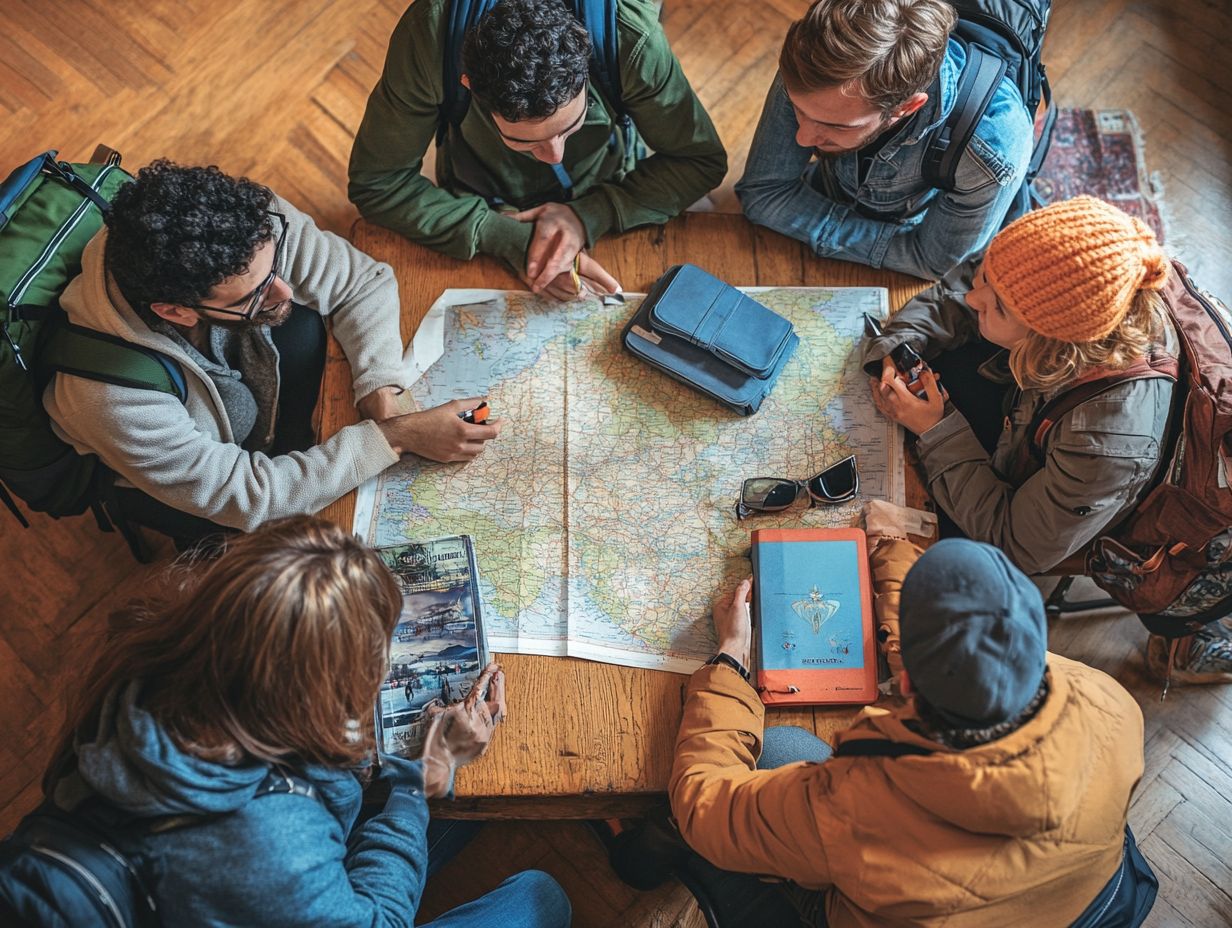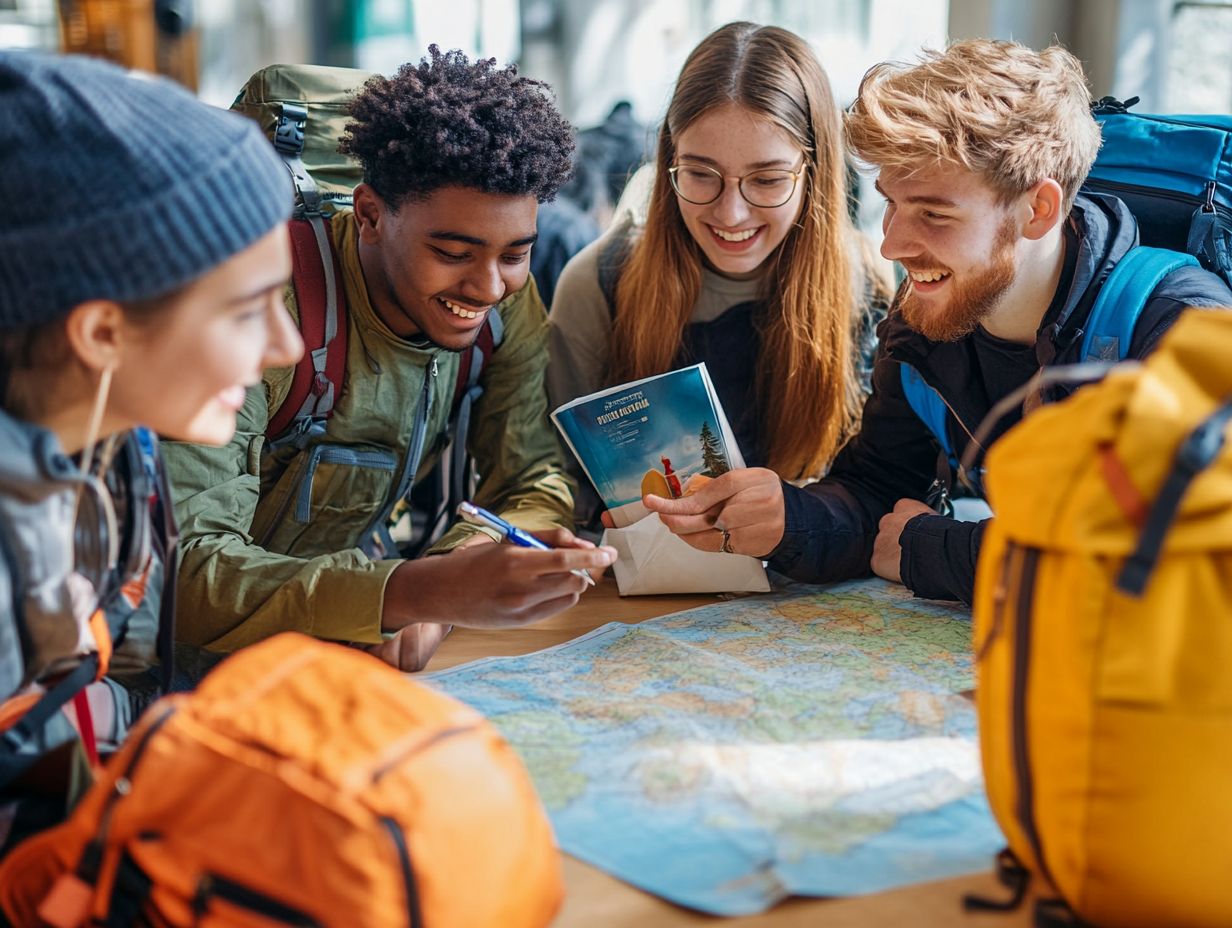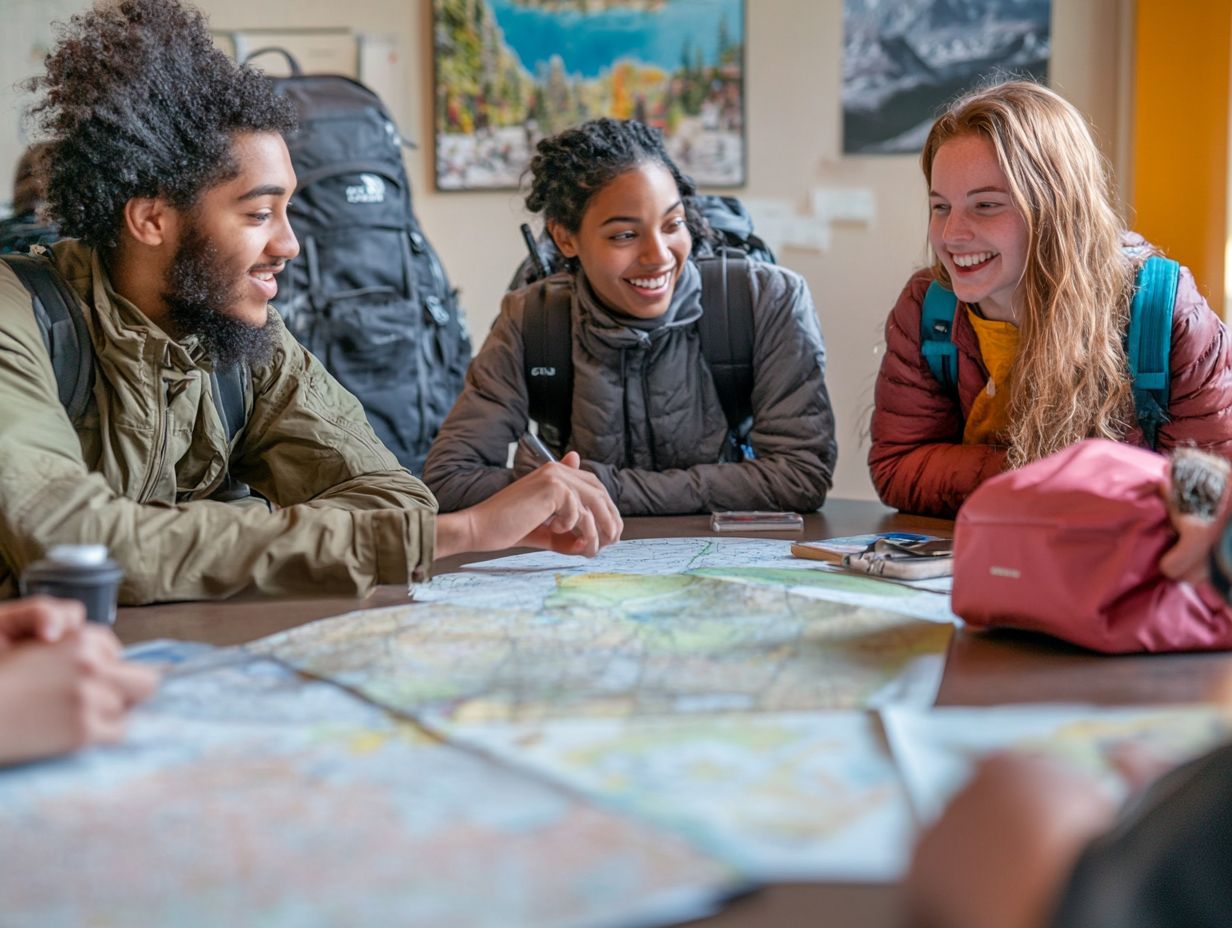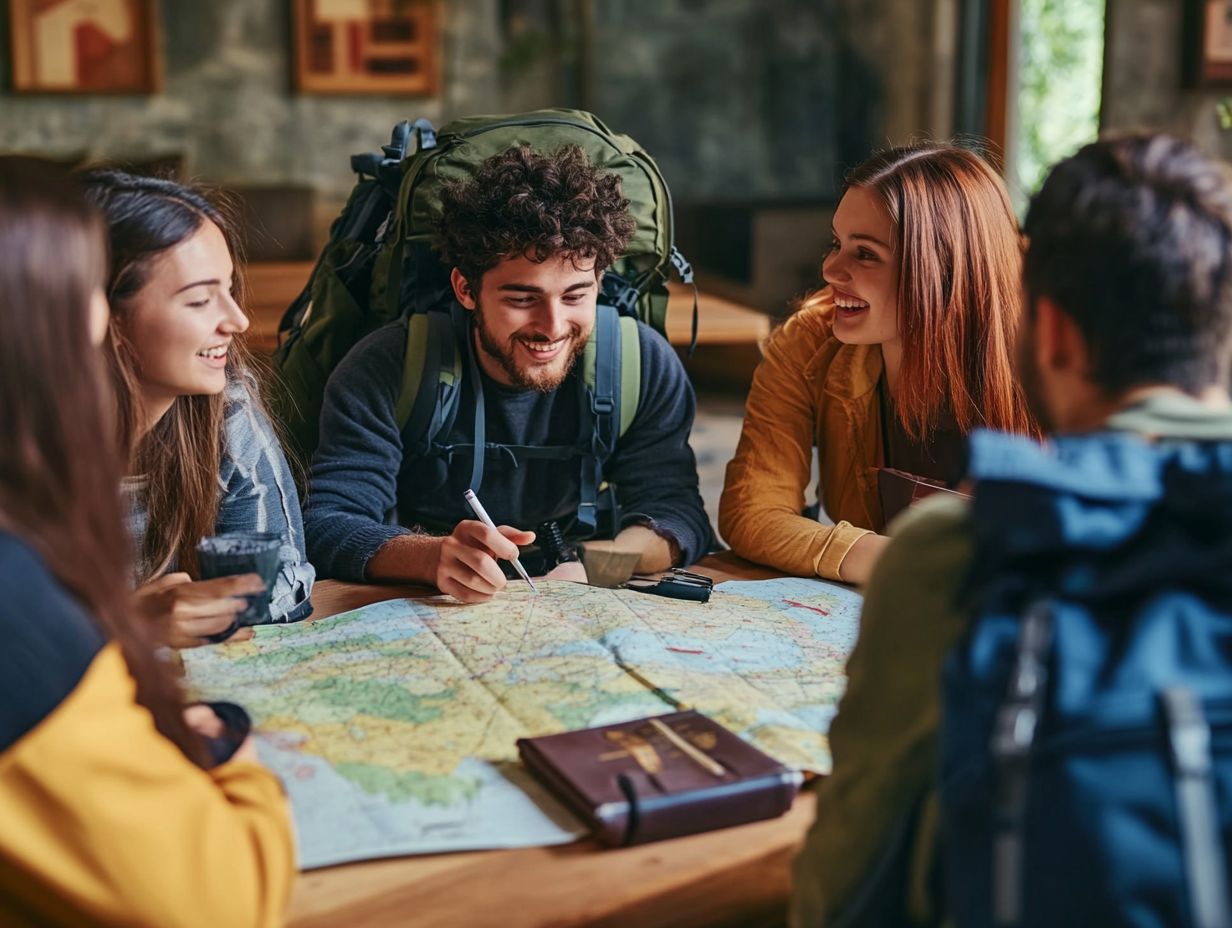5 Safety Tips for Students Traveling Abroad
Get ready for an amazing adventure! Traveling abroad can be one of the most enriching experiences for you as a student. It offers a unique chance to explore new cultures, meet diverse individuals, and create lasting memories. However, it also presents challenges and potential risks that you should be aware of.
This guide shares essential safety tips to keep you secure and confident while navigating your journey. From meticulously planning your destination and safeguarding important documents to ensuring you stay connected with loved ones, you ll find everything you need to prepare effectively.
Discover how to travel smartly and safely while maximizing the adventure that awaits you!
Contents
- Key Takeaways:
- Tip 1: Research the Destination and Create a Travel Plan
- Tip 2: Register with the Local Embassy or Consulate
- Tip 3: Keep Important Documents Safe and Accessible
- 4. Stay Aware of Your Surroundings
- 5. Stay Connected with Friends and Family
- What Are the Most Common Risks for Students Traveling Abroad?
- Frequently Asked Questions
Key Takeaways:

- Do thorough research and create a travel plan before embarking on your trip abroad. This will help you stay organized and prepared for potential risks.
- Register with the local embassy or consulate of your destination. In case of emergencies, they can provide assistance and support.
- Keep important documents, such as passports and visas, safe and accessible. Consider making digital copies as backup.
Tip 1: Research the Destination and Create a Travel Plan
Before you embark on your study abroad adventure, it s essential to thoroughly research your destination and craft a comprehensive travel plan. This ensures that every aspect of your trip is meticulously considered, promoting both safety and enjoyment throughout your journey.
Understanding local customs can significantly enhance your experience. Getting to know the local culture allows you to engage more meaningfully with your surroundings. Being informed about potential health risks, such as necessary vaccinations or common diseases, enables you to take proactive measures for your well-being.
You should also equip yourself with key safety tips, such as emergency contacts and a solid understanding of local laws. This knowledge empowers you to navigate unfamiliar environments with confidence. Moreover, learning about the best safety tips for students can enhance your preparation. Utilizing travel resources like online forums and guidebooks can provide valuable insights into budgeting strategies, helping you manage your finances wisely while abroad.
Reliable transportation options are crucial for smooth travel. Knowing the best public transit routes or arranging dependable rideshares can lead to more enjoyable travel experiences.
Tip 2: Register with the Local Embassy or Consulate
Registering with the local embassy or consulate is an essential step for you as a student traveling abroad. This simple act provides crucial support during emergencies, ensuring you have a dependable point of contact for assistance.
By taking this important step, you ll gain access to vital travel advisories. These advisories provide updates on safety concerns and local regulations in your host country. Registration usually involves filling out an online form on the embassy’s website or visiting in person, allowing the embassy to keep track of your whereabouts.
In scenarios such as natural disasters, political unrest, or medical emergencies, the embassy can offer immediate assistance, including evacuation plans and emergency funds. For example, during a sudden outbreak of civil unrest, registered citizens are often prioritized for updates and evacuation measures, helping you navigate potentially dangerous situations with greater ease.
Tip 3: Keep Important Documents Safe and Accessible
Maintaining the safety and accessibility of important documents, such as passports, travel insurance, and identification, is crucial for your travel safety as a student. To further ensure a smooth experience, it’s wise to learn how to avoid common travel mistakes as a student, helping to prevent potential issues that could arise during your journey abroad.
To keep these essential papers secure, consider implementing strategies like using travel wallets. These wallets not only house your important documents but also offer a level of organization that can be invaluable when navigating unfamiliar locations.
Creating digital backups of all necessary documents allows you to retrieve information easily in case of loss or theft. It s wise to have printed copies stored securely perhaps with trusted companions while also maintaining digital versions accessible on your smartphone or through cloud services.
Such precautions maximize your preparedness and provide peace of mind, enabling you to focus on enjoying your travel experience.
4. Stay Aware of Your Surroundings

Stay alert! Your safety depends on it. Being aware of your surroundings can help you avoid theft and other dangers while traveling.
Observe local customs and behaviors. Understanding small differences in local customs will help you stay safe.
Know the layout of neighborhoods. Identify safe routes and nearby resources to boost your confidence.
Always choose trustworthy transportation options. Stay vigilant in crowded places, like markets, to spot suspicious activities.
Secure your personal belongings to reduce the risk of theft. Be mindful of what’s happening around you at all times.
5. Stay Connected with Friends and Family
Stay in touch with friends and family while you travel. It s vital for your mental well-being and creates a reliable support system in emergencies.
Use social media to share updates and experiences. Messaging apps allow quick check-ins and help bridge the distance.
Make a list of emergency contacts, including local authorities and fellow travelers. This adds an important layer of security.
Share your travel plans with loved ones. This ensures they know how to reach you while you explore new places.
What Are the Most Common Risks for Students Traveling Abroad?
Understand the risks associated with student travel abroad. This knowledge prepares you to stay safe as a student abroad and healthy.
Risks vary by destination. They can include theft, accidents, health emergencies, and legal challenges from misinterpreting local laws.
Conduct thorough research about your destination. Stay updated on travel advisories and avoid high-risk areas.
Assess your surroundings. Following safety tips, such as securing your valuables and having emergency contacts ready, can enhance your travel experience. Consider exploring unique experiences for students traveling abroad for even more enriching adventures.
How Can Students Prepare for Potential Emergencies?
Create a solid emergency preparedness plan that includes contacts and health precautions. Don’t forget travel insurance to handle unexpected risks.
Identify local emergency services, such as hospitals and police stations. This ensures quick access to help when you need it.
Know health precautions relevant to your destination, like required vaccinations. Having travel insurance covers unforeseen medical expenses and lost belongings.
What Are the Best Ways to Stay Safe While Exploring a New Place?

Staying safe while exploring a new place requires adherence to essential safety tips and being mindful of your personal safety. For those considering solo adventures, check out these tips for traveling solo as a student. Choose reliable transportation options, especially when traveling in groups or enjoying a drink.
When you venture into uncharted territories, prioritizing group dynamics is key. Exploring alongside companions reduces risks and enhances your adventure. Practicing responsible alcohol consumption safeguards your well-being and keeps everyone alert.
Embracing cultural awareness is just as important. Respecting local customs and traditions prevents misunderstandings and fosters a positive experience. Understanding local dress codes and social behaviors can enhance your safety and make interactions more harmonious.
What Are the Top Destinations for Student Travelers?
When selecting top destinations for student travelers, consider factors such as safety and the availability of resources that enhance your study abroad experience, including essential travel tips for first-time students abroad.
Cities like Barcelona, Sydney, and Tokyo boast vibrant cultural scenes and extensive support networks for students. This ensures a seamless transition for international learners.
Barcelona enchants with its unique blend of modernist architecture and rich culinary traditions. Sydney s stunning beaches and outdoor lifestyle foster a strong sense of community among students.
Tokyo presents an intriguing mix of ancient traditions and cutting-edge technology, providing endless opportunities for learning about local cultures. Safety remains a top priority in these destinations, with strong local services ready to assist students.
These vibrant places will boost your personal and academic growth, creating memories you’ll cherish forever!
How Can Students Save Money While Traveling Abroad?
You can save money while traveling abroad by adopting effective budgeting strategies and utilizing travel resources wisely. Remain vigilant against scams that could jeopardize your financial security.
One practical approach is to explore affordable accommodation options like hostels, guesthouses, or local homestays. These often come at a fraction of hotel prices and provide unique cultural experiences.
For getting around, consider tapping into public transit systems or car-sharing services. These can significantly reduce your costs compared to traditional taxis.
Dining out can strain your budget, so opt for local food markets or use shared kitchen spaces. This can lead to substantial savings and a chance to experience local cuisine authentically.
Several online platforms offer student discounts on tours and activities, enhancing your travel experience without putting a dent in your wallet.
Stay informed about common travel scams, such as overcharging and counterfeit ticket vendors, to ensure your money is spent wisely and securely.
Start planning your adventure now!
What Are the Most Important Items to Pack for a Safe Trip?
Packing the right items for travel is essential for ensuring your safety as a student traveler. This means incorporating vital health precautions, securing your passport, and considering 5 tips for traveling solo as a student to protect your personal belongings throughout the journey.
Beyond these basics, consider including items such as:
- First-aid kits: A first-aid kit can be a lifesaver.
- Hand sanitizers: These keep germs at bay.
- Extra batteries for essential devices
- Health insurance documents
These items will help you navigate unexpected medical situations that may arise. Keeping copies of important documents like identification, visas, and travel itineraries in a secure but easily accessible spot can prove invaluable during emergencies.
Using safety items like anti-theft backpacks or locks for your luggage is crucial for safeguarding your personal belongings.
By being thorough and deliberate in your packing choices, you can significantly reduce potential risks and pave the way for a smoother, more enjoyable travel experience.
Watch this video for tips on packing wisely for your travels.
Frequently Asked Questions

What are the five most important safety tips for students traveling abroad?
1. Research your destination thoroughly: Before traveling, make sure to research important information such as local laws, customs, and potential safety risks.
2. Keep important documents safe: Make copies of your passport, visa, and other important documents and keep them in a safe place, separate from the originals.
3. Stay connected: Ensure you have a working phone with you at all times and keep important contact numbers, such as the local embassy, in case of emergencies.
4. Be aware of your surroundings: Stay alert and aware of your surroundings, especially in unfamiliar places. Avoid walking alone at night and trust your instincts if you feel unsafe.
5. Follow local safety measures: Familiarize yourself with local safety measures, such as emergency procedures and common scams, to avoid any potential dangers. For additional insights, check out traveling off the beaten path for students.
Should I purchase travel insurance before going abroad?
Yes, it’s highly recommended to purchase travel insurance before traveling abroad. Travel insurance is your safety net, covering everything from medical emergencies to lost items!
What should I do if I encounter a dangerous situation while abroad?
If you find yourself in a dangerous situation while traveling abroad, remain calm. Contact local authorities and your embassy for assistance. If possible, remove yourself from the situation and seek a safe place.
What are some ways I can save money while traveling abroad?
To save money while traveling abroad, consider staying in budget-friendly accommodations, using public transportation instead of taxis, and eating at local restaurants rather than tourist spots. You can also travel during off-peak seasons for lower prices.
What can I do to stay safe while using public transportation in a foreign country?
To stay safe while using public transportation, keep your belongings close and be aware of pickpockets. Avoid using public transportation late at night, and only use licensed and reputable services. Familiarize yourself with the transportation system and have a map or navigation app on hand to avoid getting lost.
What should I remember when using my debit or credit cards while abroad?
When using your debit or credit cards while traveling abroad, inform your bank beforehand to avoid issues with your card being blocked for suspicious activity. Keep your cards and PIN number safe, and try to use ATMs in secure locations. Use credit cards for larger purchases and cash for smaller transactions.
Remember, a well-prepared traveler is a safe traveler. Start packing smart today!




